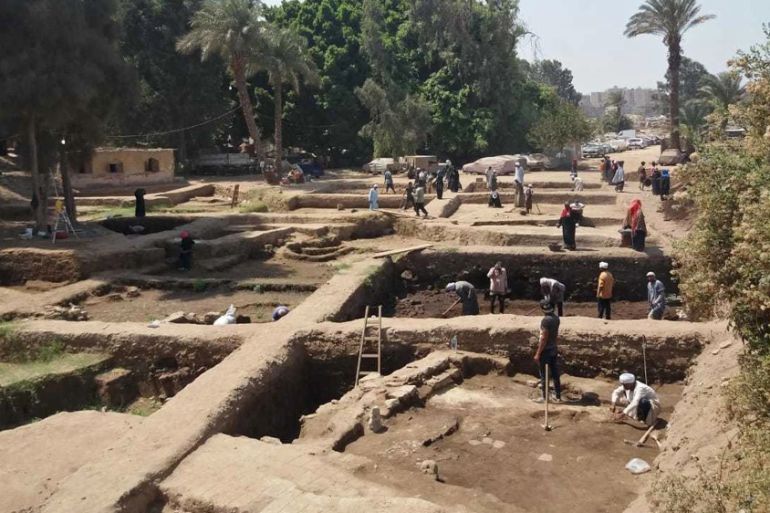Egypt: Artifacts discovered in Cairo could be 4,000 years old
A joint mission of Egyptian and German archaeologists found several fragments of stone slabs in eastern Cairo.

Archaeologists working at a dig in Cairo have found several fragments of stone slabs with inscriptions that could be 4,000 years old, Egypt’s Ministry of Antiquities said.
Some of the limestones date to the 12th (founded in 1991 BCE) and 20th dynasties, of the Middle and New Kingdoms, the ministry said on Tuesday.
Keep reading
list of 4 itemsIsrael qualifies for Eurovision final amid Gaza war protests
Slum to stardom: Indonesian film director Joko Anwar is riding high
The surfer chef behind South Africa’s first fine dining halal restaurant
German Egyptologist Dietrich Raue, the head of the mission, said one inscription referred to Atum, an important and frequently mentioned god, as being responsible for the flooding of the Nile River in the Late Period between 664 and 332 BCE.
Matariya, in eastern Cairo, was once part of the ancient city of Heliopolis, or the city of the sun.
![A photo released by the Egyptian Ministry of Antiquities shows part of a stone slab that was discovered at a dig in eastern Cairo [Egyptian Ministry of Antiquities via AP]](/wp-content/uploads/2018/11/e316a9fcb22a4dff8bf266402314d75f_18.jpeg)
Egypt has seen a haul of archaeological finds over the past two years.
A sandstone sphinx dating to the Ptolemaic Dynasty was found in the southern city of Aswa in September.
The Ptolemaic Dynasty ruled Egypt for roughly 300 years – from around 320 to about 30 BCE.
In May 2017, Egypt’s Ministry of Antiquities announced the discovery of what is believed to be the 3,700-year-old burial chamber of a pharaoh’s daughter in a suburb of Cairo.
Archaeologists also found 12 cemeteries that are believed to be about 3,500 years old.
Another 17 mostly intact mummies were found that month in central Egypt. These mummies were thought to be from Egypt’s 600-year Greco-Roman period, which began in 323 BCE.
Egypt frequently announces archaeological discoveries, hoping this will spur interest in its ancient treasures and revive tourism, called the “lifeblood” of its economy, which declined following a failed revolution in 2011, the military coup that put President Abdel Fattah el-Sisi in power and a series of extremist attacks.